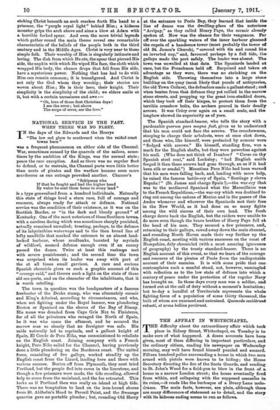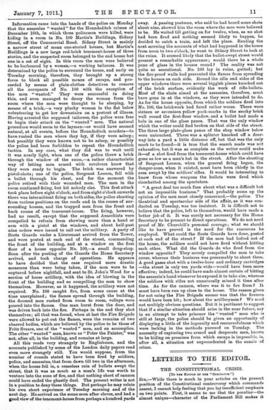THE AFFRAY IN WHITECHA_PEL. Information came into the hands of
the police on Monday that the assassins "wanted" for the Houndsditch crimes of December 16th, in which three policemen were killed, were hiding in a room in No. 100 Martin's Buildings, Sidney Street, off the Commercial Road. Sidney Street is mainly a narrow street of mean one-storied houses, but Martin's Buildings is a new large red-brick tenement-house of three stories, and the suspected room belonged to the end house but one in a set of eight. In this room the men were believed to be harboured by a woman,—a working tailoress. It was determined by the police to surround the house, and early on Tuesday morning, therefore, they brought up a strong force to block all possible means of escape, and pro- ceeded by means of plain-clothes detectives to remove all the occupants of No. 100 with the exception of the men "wanted." They were successful in doing this, and even managed to decoy the woman from the room where the men were thought to be sleeping, by means of a trick,—a very plucky woman in the fiat below volunteering to get her downstairs on a pretext of illness. Having arrested the supposed tailoress, the police were free to begin their attack on the "wanted" men. The natural procedure would seem to the layman—or would have seemed natural, at all events, before the Houndsditch murders—to have rushed the men where they lay, if they were asleep ; but possibly they were known not to be asleep, or possibly the police had been forbidden to repeat the Houndsditch tactics. In any case, what they did was to wait until it was nearly light, when one of the police threw a brick through the window of the room,—a rather characteristic way of letting men armed with revolvers know that they were ready to begin. The brick was answered by pistol-shots; one of the police, Sergeant Leeson, fell with a bullet through his chest, and for the moment the police retired with their wounded man. The men in the room continued firing, but hit nobody else. This first attack took place before eight o'clock, and from eight o'clock onwards there was intermittent firing on both sides, the police shooting from various positions on the roofs and in the rooms of sur- rounding houses, and the trapped men from the front and back rooms of the tenement-house. The firing, however, had no result, except that the supposed Anarchists were compelled to refrain from showing more than a hand or arm with a pistol at the windows, and about half-past nine orders were issued to call out the military. A party of Scots Guards under a Lieutenant arrived from the Tower, and were posted at each end of the street, commanding the front of the building, and at a window on the first floor of a home opposite No. 100,—a small drug-shop. Soon after the posting of the Guards the Home Secretary arrived, and took charge of operations. He appears to have decided that the case required more drastic measures than were being taken, if the men were to be captured before nightfall, and sent to St. John's Wood for a section of horse artillery, with the idea of blowing in the front of the building and so compelling the men to show themselves. However, as it happened, the artillery were not required. No. 100 caught fire, from some cause at the time unexplained ; the flames spread through the building, the doomed men rushed from room to room, volleys were poured into the flames. One man burst from the door, and was driven back into the fire. Perhaps in the end they shot themselves; all that was found, when at last the Fire Brigade were allowed to put out the flames, were the remains of two charred bodies, which are believed by the police to be those of Fritz Svaars, one of the " wanted " men, and an accomplice. The other " wanted " man, known as "Peter the Painter," was not, after all, in the building, and remains at large.
All this reads very strangely to Englishmen, and the accounts published by some of the London daily papers read even more strangely stilL You would suppose, from the number of rounds stated to have been fired by soldiers, police, and assassins, that from dawn till two in the afternoon, when the house fell in, a ceaseless rain of bullets swept the street, that it was as much as a man's life was worth to venture into the zone of fire, and that nothing short of cannon could have ended the ghastly duel. The present writer is not in a position to deny these things. But perhaps he may relate his own short experience of Tuesday morning and of the next day. He arrived on the scene soon after eleven, and had a good view of the tenement-house from perhaps a hundred yards away. A passing postman, who said he had heard some shots about nine, showed him the room where the men were believed to be. He waited till getting on for twelve, when, as no shot had been fired and nothing seemed likely to happen, he decided to catch a train, and left the place. Reading the next morning the accounts of what had happened in the hours from noon to two o'clock, he went to Sidney Street to look at the ruins. It seemed likely that the bullet-swept street would present a remarkable appearance ; would there be a whole pane of glass in the houses round ? The reality was not quite so sensationaL No. 100 lay in ruins, gutted; but the fire-proof walls had prevented the flames from spreading to the houses on each side. Round the sills and sides of the upper windows there were several biggish pieces knocked out of the brick surface, evidently the work of rifle-bullets. Most of the shots aimed at the assassins, therefore, must have gone in at the windows, as they were intended to do. As for the house opposite, from which the soldiers fired into No. 100, the brickwork had fared rather worse. There were sixteen or seventeen yellow pock-marks in the smoky brick wall round the first-floor window, and a bullet had made a hole in one of the glass panes. That was the only window which the writer could find broken on that side of the street. The three large plate-glass panes of the shop window below were untouched. There was a splinter knocked off a door- way into a yard a little distance off, but that was the only mark to be found—it is true that the search made was not exhaustive, but it was as complete as the writer could make it—of a shot fired from the tenement-house which could have gone as low as a man's hat in the street. After the shooting of Sergeant Leeson, when the general firing began, the danger-zone, when it existed, must have been chiefly in the area swept by the soldiers' rifles. It would be interesting to know from whose weapons the bullets were fired which ricochetted among the spectators.
"A great deal too much fuss about what was a difficult but not an impossible business." That probably sums up the opinion of the men most closely concerned,—the police. The theatrical and spectacular side of the affair, as it was con- ducted on Tuesday, was too insistent. It is difficult not to believe that the police, left to themselves, would have made a better job of it. It was surely not necessary for the Horne Secretary to be present to direct operations. We do not need proof of Mr. Churchill's personal courage ; what we should like to have proved is the need for the resources he employed. What could the Scots Guards have done, posted at each end of the street ? If the men had bolted out of the house, the soldiers could not have fired without hitting each other. What did the Guards do who fired from the window opposite ? They merely compelled the men to take cover, whereas their business was presumably to shoot them. A good game shot with a twelve-bore and ordinary cartridges —the street is only ten yards wide—would have been more effective; indeed, he could have made almost certain of bitting the assassin's hand whenever he exposed it to take aim, whereas the soldiers with rifles not unnaturally missed it time after time. As for the cannon, where was it to fire from ? It must have been run up close to the house. The reason given for not using the Fire Brigade sooner was that the firemen would have been hit ; how about the artillerymen ? We need not multiply obvious questions. But it is pertinent to suggest that if a similar situation should arise in the near future, say in an attempt to take prisoner the " wanted " man who is still at large, the police should be given an opportunity of displaying a little of the ingenuity and resourcefulness which were lacking in the methods pursued on Tuesday. The necessity of capturing two armed and desperate men, known to be hiding on premises from which escape is impossible, is, after all, a situation not unprecedented in the annals of crime.



















































 Previous page
Previous page